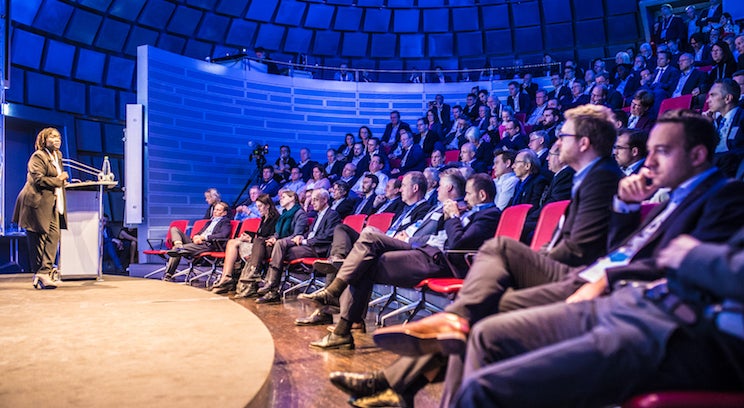
Your company is a person, legally speaking. And shouldn’t that person be the best possible representation of your company? A corporate social responsibility (CSR) program is a way to foster a unifying feeling of morality and accountability among employees.
CSR appears in many forms, whether in robust procedures for supply chain management, corporate donations, or an employee volunteering program. But, to make a case to an executive board or department head, certain characteristics may be invaluable assets for creating your CSR program’s identity, purpose, and sustainability. This article presents five main traits of German software group SNP’s CSR program that may help you make your case for your company’s CSR program.
This past November, SNP hosted Dr. Auma Obama, community activist, journalist, and half-sister of US President Barack Obama, as a keynote speaker at its annual Transformation World event in Heidelberg, Germany. Watch her video presentation.
Inspired by her presentations, energy, and outlook, SNP CEO Dr. Andreas Schneider-Neureither donated a basketball court to Sauti Kuu Foundation. Dr. Obama is an executive board member of the Kenyan-based nonprofit organization that helps impoverished children and young people become economically independent.
Below are some of Dr. Obama’s words of wisdom that can help you begin your company’s CSR program.
1. Knowledge transfer
As Dr. Obama says, “Use what you have to get what you need.” Your company has a wealth of knowledge and resources, from the processes and records that generations of employees have contributed to the company, all the way to the systems that currently house the data.
The first step to any major endeavor is to collect insights from colleagues who are interested in creating a CSR program with you. The most valuable insights may include successes and failures from past CSR programs or experiences that may help establish a more vigorous program today.
Taking steps towards knowledge transfer conveys that a company values innovation and exchange. Successfully transferring knowledge both internally and externally brings people together for the advancement of initiatives, including investments from stakeholders.
These investments may include seed money for the start of the program, employee volunteers to run the program, and external persons willing to offer insight, equipment, or other resources.
2. Common goals
Having common goals in place prior to a presentation will strengthen your initial CSR proposal, for the basis of sociality is the cooperation of people. The success of a CSR program does not depend on one individual. Written goals, plans for implementation, and the cooperation of stakeholders across your organization (e.g., human resources, marketing, and procurement) will set the stage for the “what” and “how” of your initiative.
Essentially, the purpose of any CSR program is to make a meaningful contribution to the program and the company’s goals. It is not enough to simply make monetary contributions or other donations; there must be a value-add for the impact on the economic value chain.
To quote Dr. Obama, “The idea of what we’re trying to do, and the success of our work is when people are able to become part of the economic value chain. That is when we’ve succeeded.”

3. Company values
Every institution, like every individual, has a set of core values that drive the organization forward. Stay true to company values. Core values are often identity-driven and have messages for employees, customers, or partners, whether natural persons or otherwise, that set a framework for what a company represents.
Dr. Obama’s message to individuals rings true for companies as well: “What is your identity? If you do not have an identity, if you do not know who you are, you cannot grab the opportunities that exist.” By extension, an engaging CSR program will be consistent with your company’s purpose.
SNP, for example, specializes in digital transformation and harmonizing systems, whether by acquisition, divestiture, or data migration. Giving back to its global community is staying true to SNP's roots, for it grew by acquisition and brought people together as a result. Today, its mantra is “ONE SNP” as it continues to harmonize and expand our value chain.
4. Thought leadership
The value is always in the people. Thought leaders not only have a plethora of innovative ideas, but they are also mentors, instigators, and drivers for the next generation of thought leadership.
Plan for your CSR program to be successful beyond its pilot year. Look forward to sustainability by continuously bringing in people who want to contribute. As Dr. Obama said, “Take the initiative. Embrace the value of productivity.”
5. Continuous transformation
At SNP, transformation starts with people and continues through the digital landscape. Thinking long-term means adapting to change. If one of your CSR goals includes making a transformative impact on the world, consider making room for change and adaptation, especially to meet any budget constraints.
Maximizing the value of each corporate dollar and each employee hour, for example, means finding ways to deliver the same initiatives in more efficient ways. Cost and the value delivered are integral parts of every initiative.
If cost is the primary roadblock for your CSR program or initiative, start small. Engage a group of key stakeholders and collect data for the next initiative by offering a greater value proposition based on prior experiences. Embrace transformation and your CSR program may take you further than you initially imagined.




